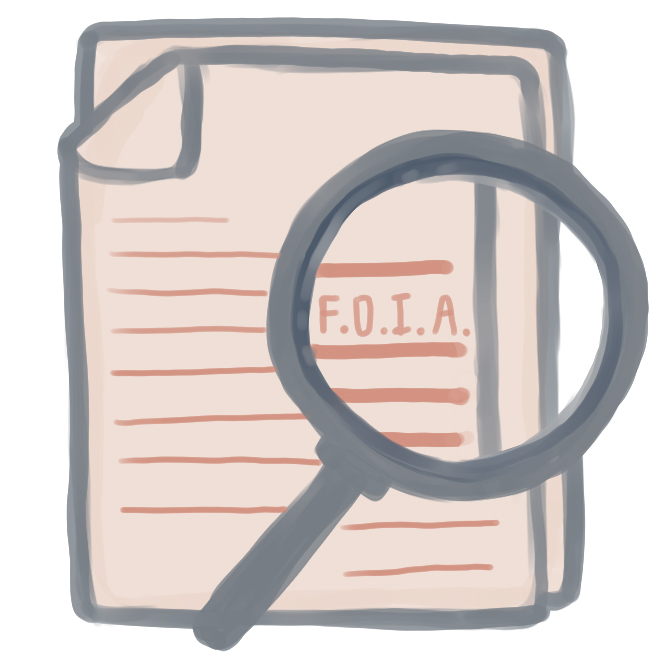
Graphic by Louise Nillas | Mercury Staff.
Sometimes, with an institution as big as a university, it
can be difficult to see mistakes if you’re just another cog in the machine.
After all, bureaucracies are made of humans, and humans make mistakes. I firmly
believe that it’s invaluable to have someone checking your work — ultimately,
it makes you better at your job. So I think it’s time to have a talk about the
Freedom of Information Act.
Maybe you’ve glanced at the news and heard some anchor talk
about using FOIA to access the full Mueller report. But we don’t really need to
venture that far from UTD. Someone at the Student Government debate said that
they’d “FOIA” Chartwells information. Three professors are suing the university
over records they allege shouldn’t have been released under FOIA. The act has
also formed the basis of a lot of the reporting on this university lately — not
only what’s published in The Mercury, but in local and national coverage, too. Depending on who
you talk to, FOIA can be either a source of fear or empowerment. But here’s the
thing: Not everyone seems to understand what you can and cannot do under FOIA.
So what is FOIA? Why is everyone talking about it? And most importantly, why
should we care?
FOIA is the federal law that allows anyone — not just
journalists — to request any information from any government entity. Each state
also has its own version of FOIA, which extends those rights to information
held at the state and local level. In Texas, our version is called the TPIA, or
the Texas Public Information Act. There’s an important philosophy enshrined in
these laws: Government is meant for the people, by the people, and its
information, for the most part, is the property of the public.
When I say you can ask for anything, I mean that literally.
You can ask for the receipts for the fast food buffet that our president
purchased to feed the Clemson University football team. You can ask for the
Post-It notes on Governor Greg Abbott’s desk.
Because UTD is a state-funded school, it’s also subject to
public records laws. You can ask for the annual operating budget of the parking
office, the salary of any UTD employee or any email sent through a UTD email
address.
The key word here is “ask.” UTD — or any other government
agency — doesn’t have to actually give you any of that information. But under
public records laws, it has to at least make an effort.
Some
agencies, like UTD and the City of Richardson, have a form that you can use to
request information. But you don’t have to use that — just send a letter or an
email to the relevant public information officer and give a detailed
description of what you want and how they should send it to you. They have to
respond to you — in some capacity — within 10 business days.
That said, a government agency can make it really hard for
you to access that information. A public information office can charge
excessive fees, stall a request for long periods of time or send you a document
that’s just pages and pages of redacted content. Sometimes, the information
you’re seeking just might not exist within that particular agency, so it’s
important to do a little homework beforehand.
Luckily, it’s pretty difficult for government agencies to
outright deny a request. In Texas, if an agency doesn’t want to give you
something, it needs to file a legal brief with the Office of the Attorney
General to ask its permission to deny you the information. If that happens,
then, you, the requestor, should also make your case to the AG. Think of it like
a legal case. The AG has 45 days to make a ruling on the release of the
information. If your request is denied or blocked, or if you’re told to pay a
hefty fee to access the information, that’s not the end either. You can appeal
the AG’s decision.
And sometimes, if an agency seems to be stalling, you can
file a request asking for a list of related requests that other people have
made before you. Chances are, someone else wants that information just as much
as you do, and they’ve already done the footwork.
A lot of this can be avoided by just writing better
requests. For example, if you anticipate redactions, then ask the agency to
cite the legal exception that justifies the redaction. But above all, being
respectful and specific goes a long way. There are also some very helpful
resources accessible through the FOIA Foundation of Texas.
But the onus isn’t just on you, the requestor.
Historically, people don’t make a lot of FOIA requests,
especially at smaller government institution such as UTD. But we should hold
UTD to the same high standard as the rest of our government . After all, as a
recipient of taxpayer dollars, UTD is subject to the same standards of
accountability and transparency. Government is meant to serve the people, and
that means making sure that governmental actions and bureaucratic processes are
transparent to the citizens who are ultimately affected by those actions.
Public records requests are a huge part of that — they allow citizens access to
the inner workings of their government so they can better understand it, be
able to point out mistakes when they do happen and hold their leaders and
administrators accountable. We, as members of this community, have a duty to
use these powerful policy tools as effectively as possible. And for the public
officials who maintain this information, instead of seeing a FOIA request as a
possible threat, see it as a sign that someone is interested in your work. See
it as a sign that the government is functioning as it should.
Megan Zerez is a biotechnology
master’s student from Honolulu, Hawaii.